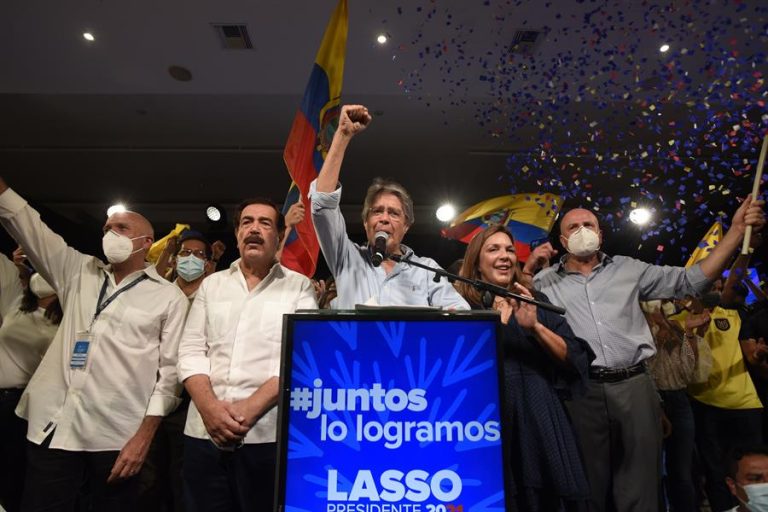12 de abril 2021

Children of Exile: The Births “Sowing Hope” in the Camp of Nicaraguan Farmers

PUBLICIDAD 1M
PUBLICIDAD 4D
PUBLICIDAD 5D
The conservative candidate advocated for “unity” and “dialogue” among all Ecuadorians as a formula to solve serious problems

Photo: EFE
The presidential candidate of the conservative CREO-PSC alliance, Guillermo Lasso, was the winner of the elections held this Sunday in Ecuador. With 99% of the tally sheets he obtained 52.46% of the votes, five points above his rival Andrés Arauz (47.54%). An impressive over 80% of the eligible voters turned out to the polls.
“Ecuadorians have chosen a new course, very different from the last 14 years,” said Lasso from the palace of conventions in Guayaquil, in his first statements when his lead appeared insurmountable.
Lasso is a former banker and three-time presidential candidate. He advocated for “unity” and “dialogue” among all Ecuadorians as a formula to solve the serious problems that afflict his country, aggravated by the coronavirus pandemic.
The 65-year-old managed to reach the presidency in his third attempt, after defeating Andres Arauz, the candidate of exiled former president Rafael Correa. His victory is an about face in Ecuadorian politics, with its first right leaning government since before 2003.
The president-elect heads the center-right movement Creando Oportunidades (CREO), which he founded in 2012. He maintains that the schemes of the left and right “have lost their validity globally”. However, he took part in these elections allied with the right-wing Social Christian Party.
Lasso went on to the second round after obtaining 19.74% of the votes in the February 7 elections. In the first round, Arauz managed to lead him by more than twelve points. This placed Lasso at a disadvantage.
From his two defeats in the presidential elections of 2013 and 2017, the conservative politician claimed he took note of the needs of the people.
Arauz, candidate for the leftist alliance Unión Por la Esperanza (Unes) and political heir to former President Rafael Correa (2007-2017), acknowledged his defeat saying that it is a “political setback but not a“ defeat.”
In an unusual act in Ecuadorian politics, Arauz told a group of followers that he will personally call Lasso to congratulate him on his electoral victory. He said this demonstrates the democratic spirit that guides his political formation.
“We are going to work decisively for the seventeen million Ecuadorians, leaving no one behind,” said Lasso. He seeks “the change to a prosperous country” and “where no one has to be afraid.”
Despite his victory, Lasso will have serious problems to govern, since in the National Assembly his party barely has 12 seats out of 137, and his PSC allies another 19.
Two readings emerge from Lasso’s victory at the polls. The first, the important anti-Correa vote won. Secondly, the relevance of supporters of the invisible candidate in these elections, Yaku Perez. The indigenous leader, who barely lost out to Lasso for second place in the first round of voting, asked his supporters for a null vote, which reached a historical level of 16.25%.
The indigenous vote was the great uncertainty of these elections. The rupture last Saturday of the leader Jaime Vargas, president of Conaie, to align himself with Arauz, had sown great concern in the center-right camp.
And even so, the null vote came close to the vote that Pérez obtained in the first round as a candidate for president for the Pachakutik formation.
Lasso was running for these elections as the underdog, judging by the results of the first round. However, two events helped him soar. The face-to-face presidential debate on March 21, and the publication that his rival had been on the Central Bank payroll until August 2020, although he was on leave of absence.
After having a spinal operation in 2018, which forces him to walk with a cane, in the campaign Lasso sought the support of the center, the indigenous sector, youth and women, as well as groups far from the traditional orbit of Social Christians like the LGTB.
In his victory speech, he promised to defend the members of this group, as well as women, teenage mothers, peasants, workers, doctors, among others.
Slightly more than thirteen million voters were called to the polls in Ecuador and abroad. After the shift to the left experienced in Argentina and Bolivia, these elections were considered a geopolitical barometer in Latin America.
The successor of Rafael Correa, the still president, Lenin Moreno, had withdrawn from the former’s political views. Nonetheless, the Correa current continues to cause bitterness and division among a large part of the Ecuadorian population.
If the invalid vote were a message of political protest, the majority of the electorate turned towards Lasso as an anti-Correa option.
Archivado como:
PUBLICIDAD 3M
Agencia de noticias internacional con sede en Madrid, España. Fundada en Burgos durante la guerra civil española en enero de 1939.
PUBLICIDAD 3D